Barry Prague first saw Israel from the sea while working as a purser for P&O Cruises in the 1980s. At the age of 28, he fell in love with his Israeli wife Orit and left his hometown of Golders Green to emigrate to Israel.
The couple raised three sons and moved 14 years ago to Kibbutz Dafna in northern Galilee, less than two miles from the Lebanese border. “It’s a beautiful place with the River Dan running through it,” says Barry, who will turn 70 in November. “Water is rare in Israel, so it’s special to have our own river.”
The kibbutz, which recently celebrated its 85th anniversary, produces apples and dairy products and recently opened a hotel and food mall. “It’s a wonderful place to live and raise a family. We were very happy there. But on Oct. 7, everything changed.”
Get The Jewish News Daily Edition by email and never miss our top stories. Sign up for free
I met Barry earlier this week during a visit organized by the Jerusalem Press Club in his temporary home in the village of Dalia, 40 miles south of his beloved kibbutz on the sun-drenched shores of the Sea of Galilee.
Before Hamas attacks in the south and subsequent Hezbollah rocket attacks in the north, Dalia was a popular family resort. Now it is home to only hundreds of internally displaced Israelis like Barry and Ornit, who live in limbo.
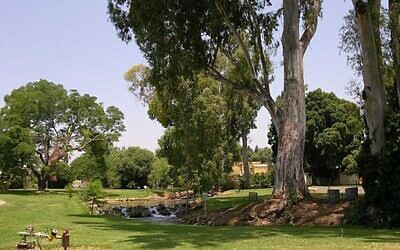
Kibbutz Dafna in northern Galilee, where the River Dan flows.
Around 80,000 Israelis have been evacuated from 28 northern border towns, including Metula, Nahariya and Kiriat Shemona, and most are living out of their suitcases in hotels and resorts, with government-paid housing and a living allowance of 200 shekels (£42) a day.
A makeshift school has been opened in Daria to help children get back to normal, and displaced residents may reportedly be able to return home in time for the new school term in September, but it is unclear whether this will be possible given the growing threat of Hezbollah attacks, which are becoming increasingly threatening.
Sarit Zehabi of the Alma Education and Research Center, which monitors Hezbollah, said the Iran-backed militia carried out 1,637 attacks from northern Lebanon between October and April using anti-tank missiles, high-trajectory artillery, drones and anti-aircraft guns.
Many northern Israelis are now planning to move permanently to the relative safety of central Israel.
Despite living in Israel for 40 years, Barry still has a strong North London accent as he recounts the horrific events that unfolded on that October Sabbath morning: “All was quiet in the north, but in the evening my wife received the news that my nephew, Iftach, had been killed. Iftach was 51 and had joined a civil defence group in the south to confront Hamas. The army had no idea what was going on, so the local defence force, made up of ex-commando soldiers like Iftach, rushed to the border with guns in hand to defend the country.
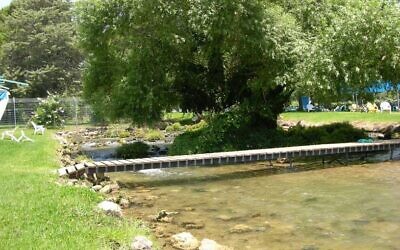
Barry and hundreds of other residents have fled the kibbutz since October with no prospect of returning.
“Seeing Hamas in Israel scared us here in the north because we live under the threat of Hezbollah every day. If the same thing could happen in the south, it was only a matter of time before we too would be invaded by an even bigger threat than Hamas.”
“We left on October 10, a few days before the evacuation was organized. There are only a handful of people left in Dafna now – mainly the local defence forces and a few workers who continue to farm the dairy. We return once a week to check that our homes are safe. The kibbutz has come under rocket attack but it is not targeted all the time. We all have psychological barriers against going back and families clearly do not want to expose their children to the constant trauma of sirens.”
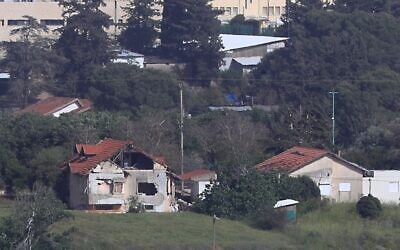
An Israeli house is damaged by Hezbollah shelling in the northern Israeli border town of Metula, as seen from the Lebanese side of Kfar Kila, a village on the Lebanon-Israel border, Thursday, April 18, 2024.
There is regret in Barry’s voice as he reflects on living in constant uncertainty: “No one knows when we’ll be able to go home. Before July 10, my wife and I were very vocal critics of the Netanyahu government. We attended as many demonstrations as we could. We blame the government for what happened. We blame them for not seeing what was coming, and for what happened after.”
Many northern residents are now planning to move permanently to the relative safety of central Israel.
“The army is doing its best. But it creates more problems for us when people like Itamar Ben Gvir (Minister of National Security) and Bezalel Smotrich (Minister of Finance) say they want to build Jewish settlements in Gaza after the war. If Ben Gvir’s supporters move to Gaza and live there, who will protect them? My sons?! I have no idea what the plan is for the next day. Never in our history have we worried just about being here, about living as Jews in a Jewish state. Now, under this leadership, we fear for the future of our country.”
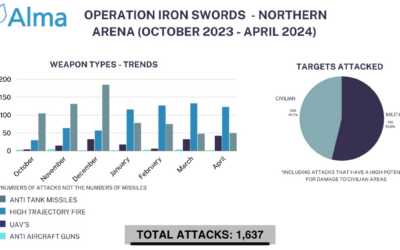
Sarit Zehabi of the Alma Education and Research Center, which monitors Hezbollah, said the Iran-backed militia carried out 1,637 attacks from northern Lebanon between October and April using anti-tank missiles, high-trajectory artillery, drones and anti-aircraft guns.
Barry, leaning back in his chair and resting his chin on his left hand, maintained an upbeat demeanor throughout our conversation despite the heavy atmosphere, but that mood suddenly changed as he spoke about Benjamin Netanyahu’s war aims and the dire situation of the 128 hostages still in Hamas’s captivity after more than 230 days.
“I suspect most of them are dead by now,” he frowns. “Those who are still alive must go home now. They have become part of a political game. They are supposed to be half the objective of this war, along with defeating Hamas. So if they are so important, where are they? Why hasn’t the government made more of an effort to bring them home? My comrades are convinced that Netanyahu is prolonging this war as long as possible for his own reasons. People are dying. Soldiers are dying. For what? For Netanyahu’s career? Sometimes I wake up and think we are living in a mad world. The whole of Israel has turned into a surreal picture where nothing makes sense anymore.”
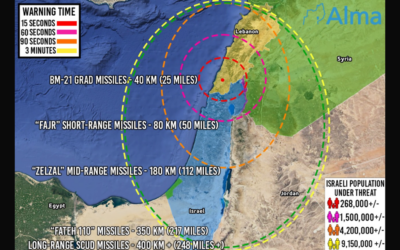
A map showing Hezbollah’s northern threat to Israeli population centers.

